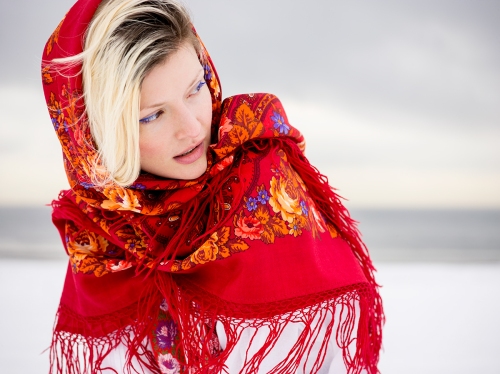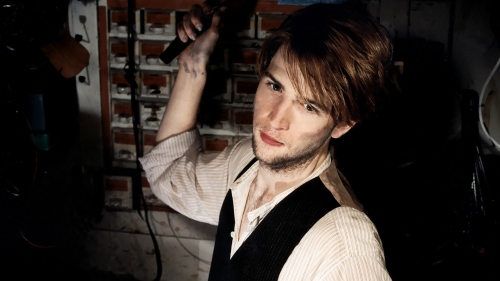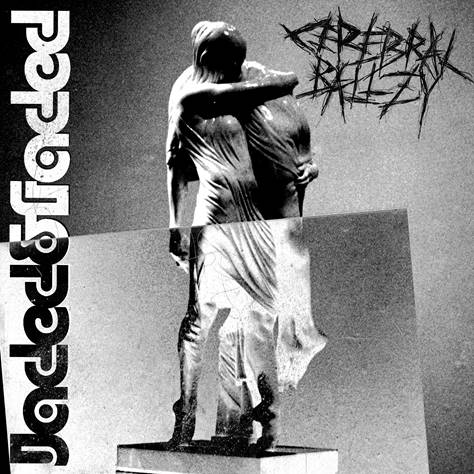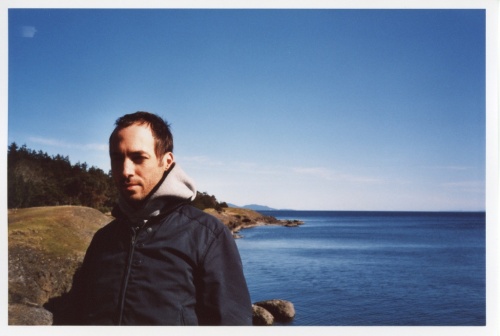
“I should begin by saying that one of my earliest musical memories is of my mother playing a cassette recording of the Dmitri Pokrovsky Ensemble.” It’s surely no accident that Olga Bell begins our interview at this point. ‘Krai’, her debut solo LP released earlier this year via One Little Indian, is an intense interrogation of her concepts of identity and belonging: concepts which are continually shaped and reshaped by messy webs of memory and nostalgia. So perhaps a scene from Bell’s own personal history, in which numerous strands – those of family, of nationality, of music and sound – coalesce in a single moment, is the only logical starting point for our discussion. “[My mother] was a radio broadcaster and journalist. And she had a programme on Radio Moscow called ‘Folk Box’ and she would DJ music on that programme and talk about it: music from all across the Soviet Union which was a territory even more vast than Russia at the time.”
Bell’s enthusiasm for this music is palpable, even as her voice is relayed to me over the phone from across the Atlantic. The composer’s conversation is engaging and erratic, continually spinning off in unexpected transgressions and observations, her humour and personability a far-cry from the occasional steeliness of her latest record. “So even though I grew up as a classical musician, as a classical pianist, and then I moved to New York to get into electronic composition, songwriting, beat making, that sound, that sound of the Pokrovsky Ensemble…” At this point she trails off, trying in vain to recall the name of the recording, lodged somewhere deep within her subconscious. “Basically it’s this Russian folk singing sound that just became so ingrained in me I didn’t even realise it until I had this opportunity to write an original composition for voices and a band-based chamber ensemble.”
Having emigrated from Russia at the age of seven, Bell grew up in Alaska before relocating to her current home of New York. And as such, Bell’s Russian identity is little more than spectral: half-formed and elusive, learned from and displaced onto other people, other times and places. “It really begins with my mother, and then it expands to my piano teacher who is very much also like family to me,” she recalls. “Growing up I had this incredible piano teacher who I worked with from age seven to seventeen and my lessons all happened in Russian and sometimes we would have some soup after lessons. We ate a little bit of Russian food in my household growing up but because I had an American stepfather we mostly spoke English and we mostly ate like normal Alaskan people do, I guess. I do have family in Moscow still but I’ve only been back to Moscow twice since leaving in 1990.”
And it’s this deeply felt – yet residual and intangible – sense of nationality that Bell explores on ‘Krai’, a nine part song-cycle first performed at the Ecstatic Music Festival in 2011. “Judd Greenstein, who’s a wonderful composer and friend of mine around New York, asked me to share a programme with him [at the festival]. He was writing a piece called ‘Yehudim’ in which I performed. And that piece was retelling the stories of King Solomon but it was sort of a fusion of Judd’s history and Jewish culture and the music he was interested in presently. And I was inspired by that and I decided that I would do something similar for the first half of the programme which was wide open, and mine.”
Following this initial moment of inspiration, Bell settled upon the Russian concept of “krai” (pronounced “cry”) to provide the piece with its overarching structure and concept. The word has numerous meanings in Russian, which Bell outlines: “It’s an incredible little four letter word that can mean ‘my homeland’, ‘the frontier’, ‘the edge of something’. In everyday Russian, it just means ‘the edge’, like the edge of the table, or the edge of the curtain.” But the word also has a more specific definition, referring to a collection of remote regions around the country. It’s these territories that Bell’s piece explores, taking the form of a sort of sonic cartography: each of ‘Krai’’s movements evokes one of these regions, drawing on its musical and cultural traditions, its climate and landscape.
“I just googled that word ‘krai’ and at the top of the search results was the map of the krais of Russia,” she tells me. “And I had only really been to two of them and I just decided to go digitally, travel around.” Bell spent the following months engaged in painstaking research, gathering together information to use throughout the composition. “I was pretty methodical about it; I would pick one and I would write to my mom and say ‘now I’m going to spend the next few weeks trying to write something for Zabaikalsky Krai; tell me everything you know. Tell me who lives there, historically who’s lived there, what it sounds like…’ And she would just send me all these video and audio links; and her friends at the radio were able to send me incredible field recordings.”
Despite having collected her source materials remotely in this way, Bell is keen to emphasise the breadth and comprehensiveness of her research: a point that seems important to her personally as well as professionally, as an artist. “I tried to really have the greatest sample size that I could,” she continues. “I just kept searching and listening and watching until something really grabbed me and then I would study it. For the fourth movement, for instance, I was sent, by a friend who’s in Russia, just a really super-duper lo-fi recording of this little granny, and she’s singing a melody that seemed really simple but then she would change time signatures. And I was so hypnotised and enamored by it that I learned it and then I sang it into my computer and then I played it on my keyboard. I learned the technique and rhythms that she was using in this” – pausing for emphasis, marvelling at the seemingly effortless musical complexity – “little ditty that I’m sure she just rattled off like it was nothing.”
Our conversation continues to deviate via anecdotes and asides like this, bespeaking Bell’s desire to emphasise her faithfulness in recreating the sounds and traditions of the krai. “In the second movement for instance, which is ‘Altai Krai’: the indigenous music of that region is very much like Tuva which is right near by. And they have this really, really incredible throat singing. I tried to imitate that with the processor that’s working on my voice. And the very simple strummed guitar part was totally inspired by exactly what I heard on all these recordings of traditional Altai singers. And there’s a jaw-harp which I learned to play and I was able to record in my closet.” Here, she begins to laugh, acknowledging the quaintness of her attempts to approximate the music that has so powerfully captured her imagination.
Such descriptions of the process of composing and recording ‘Krai’ – insofar as they can be interpreted as efforts to establish the authenticity of the project – are perhaps surprising, or at least conspicuous. Of course, any understanding of ‘Krai’ as arising seamlessly from the cultures and places it describes is by no means unproblematic. “It’s sort of an ethnomusicological project, a little bit, but it’s still largely a work of fiction,” Bell allows, “it’s like these impressions of mine.” Even whilst it draws together threads of musical traditions, social history, and even, on occasion, natural sounds, Bell’s narrative remains as artificially constructed as it is rooted in any reality: ‘Krai’ is, and could only ever have been, a sonic reconstruction of the composer’s hyper-mediated, “digital” exploration of the territories of its title. “I could probably go to these places, especially the ones that I’ve not ever actually been to, and have a completely different experience and feel inspired to write something completely different,” she explains. “You could really make an argument that in some way it’s inauthentic.”
But rather than undermine the validity of ‘Krai’, this element of what Bell describes as inauthenticity in fact seems fundamental to the work’s evocative allure. Throughout the piece, the regions that Bell attempts to capture remain veiled in mystique, as if lying – to employ another of the many meanings of the word “krai” – on “the edge of something”. And as such, the piece as a whole can be read as an allegory for Bell’s own sense of Russianness: laden with significance yet understood at a distance, reconstructed out of fragments – stories, cultural artifacts, distant memories – non-imminent to the artist’s own experience in the here-and-now.
This tension – between Bell’s desire to create an artwork true to her homeland, true to herself, and her acknowledgement of the project’s inevitable failure – is played out strikingly within the music itself. Delivered entirely in Russian, Bell’s vocals adhere strictly to the conventions of the indigenous folk singing found across the various krai: “what I really wanted was this fully Russian experience, as far as the singing goes,” she tells me. Yet any attempts to create such a genuine, “fully Russian” experience are continually undermined by the accompanying ensemble which, in Bell’s own words, intentionally sounds “strange and impossible”, mixing elements of electronica, contemporary chamber composition, and guitar-based indie. “It’s an interesting foil to the traditional voices,” she comments, before elaborating: “There’s nothing wrong with [retelling a tradition], but I’m interested in music that provides challenges and collisions and this swing between something that is confusing and something that’s familiar and something that’s dissonant. That’s what really interests me.”
‘Krai’, then, is a piece that perpetually erodes and impedes – negates, even – it’s own progress, the fulfilment of its lofty ambitions residing at an ever-receding horizon. But if this is music about failure, then its failure isn’t without its own beauty: there’s a tragic romanticism to Bell’s acknowledgement of the futility of her (nonetheless earnest) attempts to capture, recreate, and preserve the traditions of these regions – and, by extension, her own elusive sense of nationality. In this sense, ‘Krai’ is probably better understood as a nuanced examination, not of what it means to be Russian, but of what it means to belong to nowhere in particular: to possess an identity that’s based, in the end, on loss, on absence. Or, as the composer puts it towards the end of our conversation: “I do feel American, but I think that part of the American identity is that everyone has come to America from somewhere else.” It’s a poignant image, and one that should serve as a sensitive framing for any encounter with ‘Krai’’s aloof and beguiling sonic territories.
Originally published by Loud & Quiet









